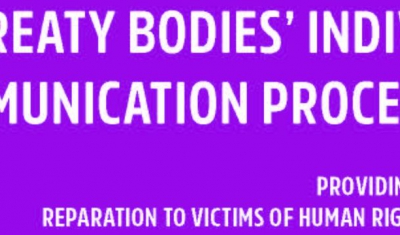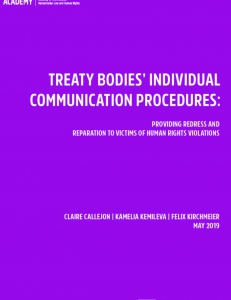Treaty Bodies’ Individual Communication Procedures (ICPs) are a major instrument to enforce the rights enshrined in the corresponding human rights treaties and provide victims with an effective remedy before an international body. They also represent a key entry point for victims of human rights violations to the United Nations (UN) human rights system.
This work is supported by a secretariat, hosted by the Office of the UN High-Commissioner for Human Rights (OHCHR) and entitled ‘Petitions and Urgent Actions Section’ (PUAS).
AT THE CROSSROAD OF A SECRETARIAT AND A LEGAL ENTITY
Even if UN treaty bodies (TBs) are not tribunals per se, they carry out legal work with the ICPs and must, therefore, be given the ways and means to do it
Our publication Treaty Bodies’ Individual Communication Procedures: Providing Redress and Reparation to Victims of Human Rights Violations precisely addressed the handling of ICPs and tackled efficiency questions related to this procedure. It also outlined a series of key recommendations to improve the system, including the creation of a judicial-like registry to provide substantive legal support to TBs.
The PUAS partially fulfils this task, struggling with institutional and financial issues, but there could be a way, through discussion and assessments to hugely improve its work.
FINDING A VIABLE SOLUTION WITH CONCRETE IMPROVEMENTS
Starting from the challenges and efficiency questions identified in our publication, this initiative aims at finding a viable solution for the ICPs and for the various actors involved – victims, states, TBs, and OHCHR as host of the PUAS.
An informal task force, made of an evolving group of stakeholders – including academics, members of PUAS, TB members, diplomats, human rights NGOs, litigators and former registrars in international tribunals – and that places victims at the centre of the debate, notably aims at equipping TBs with an appropriate tailor-made efficient and economic judicial-like registry.
SUPPORTING HARMONIZATION AND THE DIGITAL SHIFT OF THE TB SECRETARIAT
Via meetings of the Rapporteurs on individual communications of all TB concerned and OHCHR’s Petitions and Urgent Actions Section staff, the GHRP – in partnership with the Paris Human Rights Centre – facilitates discussions on the current methods and scope for harmonizing approaches.










